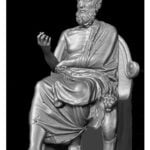
Gauguin
In 1891, Paul Gauguin (1848-1903) left his wife and five children and sailed for Tahiti, where he hoped
to immerse myself in virgin nature, to see no one but savages, live their life, with no other thought in mind but to render, the way a child would, the concepts formed in my brain and to do this with the aid of nothing but the primitive means of art, the only means that are good and true (letter quoted in Eisenman, 1997, p 77).
His decision to desert his family and follow his art has been considered by philosophers as a case study in ethics. Was his hope of artistic success adequate justification for his behavior? As luck would have it, Gauguin did become a famous artist, albeit posthumously. Can this retrospectively vindicate his flight to Tahiti? These issues are complex – both in the abstract and in terms of Gauguin’s actual life.



